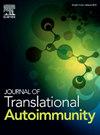Cellular therapies in rheumatic and musculoskeletal diseases
IF 3.6
Q2 IMMUNOLOGY
引用次数: 0
Abstract
A substantial proportion of patients diagnosed with rheumatologic and musculoskeletal diseases (RMDs) exhibit resistance to conventional therapies or experience recurrent symptoms. These diseases, which include autoimmune disorders such as multiple sclerosis, rheumatoid arthritis, and systemic lupus erythematosus, are marked by the presence of autoreactive B cells that play a critical role in their pathogenesis. The persistence of these autoreactive B cells within lymphatic organs and inflamed tissues impairs the effectiveness of B-cell-depleting monoclonal antibodies like rituximab.
A promising therapeutic approach involves using T cells genetically engineered to express chimeric antigen receptors (CARs) that target specific antigens. This strategy has demonstrated efficacy in treating B-cell malignancies by achieving long-term depletion of malignant and normal B cells. Preliminary data from patients with RMDs, particularly those with lupus erythematosus and dermatomyositis, suggest that CAR T-cells targeting CD19 can induce rapid and sustained depletion of circulating B cells, leading to complete clinical and serological responses in cases that were previously unresponsive to conventional therapies.
This review will provide an overview of the current state of preclinical and clinical studies on the use of CAR T-cells and other cellular therapies for RMDs. Additionally, it will explore potential future applications of these innovative treatment modalities for managing patients with refractory and recurrent manifestations of these diseases.

风湿病和肌肉骨骼疾病的细胞疗法
很大一部分被诊断为风湿病和肌肉骨骼疾病(RMDs)的患者表现出对常规治疗的耐药性或经历复发症状。这些疾病,包括自身免疫性疾病,如多发性硬化症、类风湿性关节炎和系统性红斑狼疮,其特点是自身反应性B细胞的存在,在其发病机制中起着关键作用。这些自身反应性B细胞在淋巴器官和炎症组织中的持续存在削弱了消耗B细胞的单克隆抗体(如利妥昔单抗)的有效性。一种很有前景的治疗方法是使用基因工程的T细胞来表达靶向特定抗原的嵌合抗原受体(CARs)。该策略通过实现恶性和正常B细胞的长期消耗,已经证明了治疗B细胞恶性肿瘤的有效性。来自RMDs患者,特别是红斑狼疮和皮肌炎患者的初步数据表明,靶向CD19的CAR - t细胞可以诱导循环B细胞的快速和持续耗竭,从而在以前对常规治疗无反应的病例中导致完全的临床和血清学反应。本文综述了CAR - t细胞和其他细胞疗法治疗RMDs的临床前和临床研究现状。此外,它将探索这些创新治疗方式在治疗这些疾病的难治性和复发性表现的患者方面的潜在未来应用。
本文章由计算机程序翻译,如有差异,请以英文原文为准。
求助全文
约1分钟内获得全文
求助全文
来源期刊

Journal of Translational Autoimmunity
Medicine-Immunology and Allergy
CiteScore
7.80
自引率
2.60%
发文量
33
审稿时长
55 days
 求助内容:
求助内容: 应助结果提醒方式:
应助结果提醒方式:


